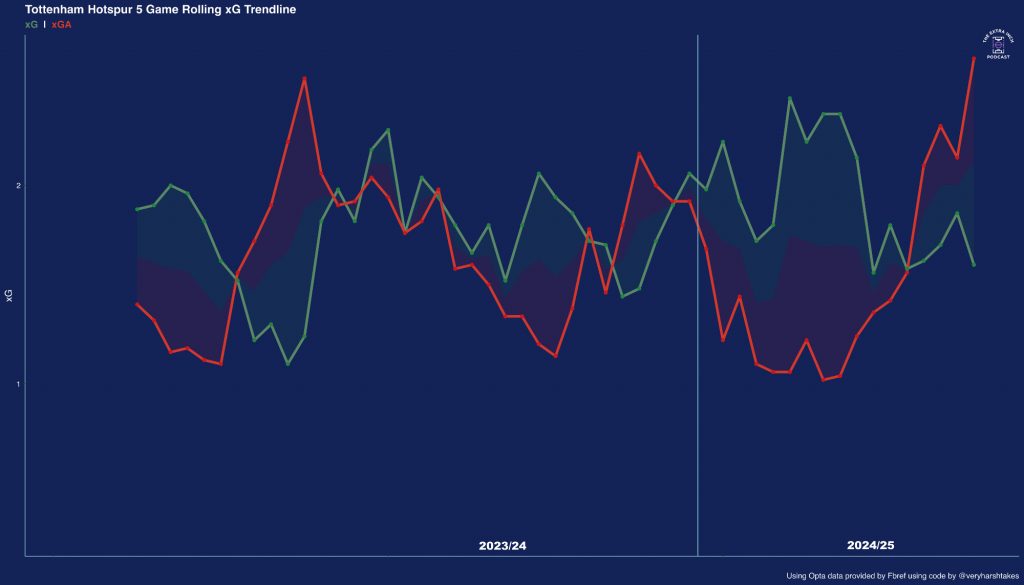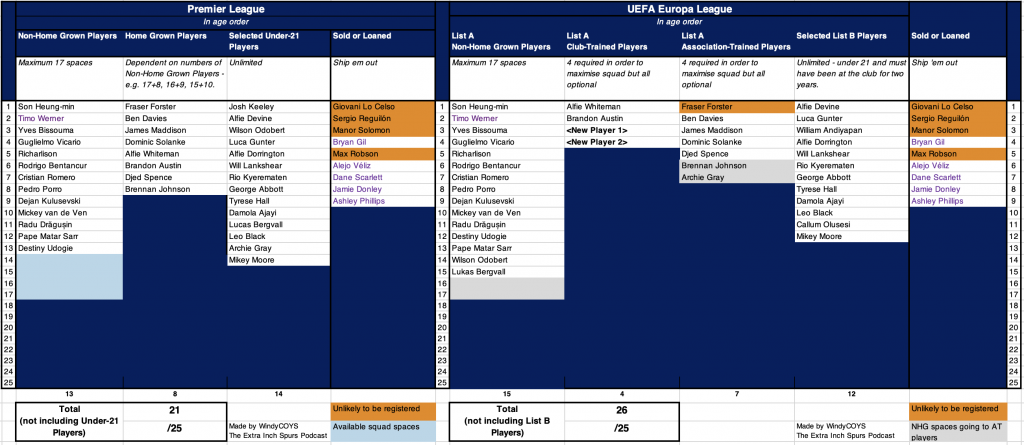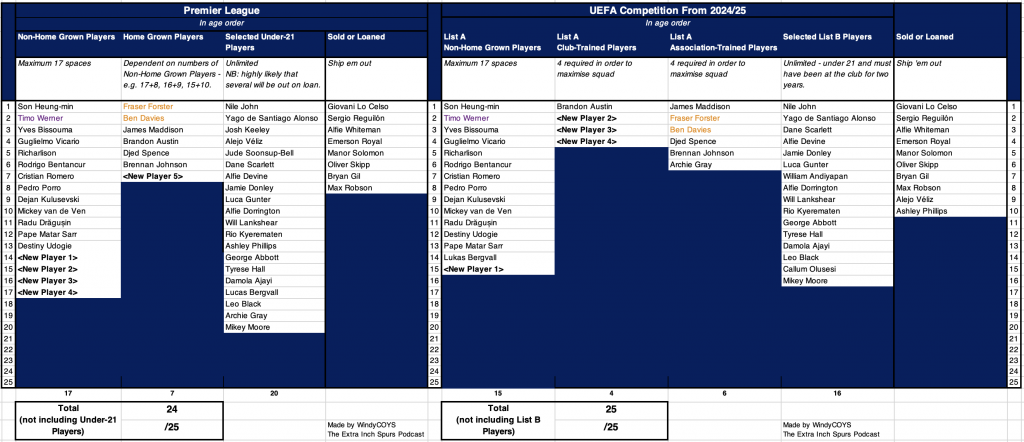In/Out
This week has seen two really good articles published in defence of Ange Postecoglou:
- The Postecoglou Experiment by profspur;
- The hot mess state of Tottenham Hotspur and where they go from here by Ryan Rosenblatt.
These are two excellent contributors on Spurs, and I really enjoyed both of these pieces.
In summary, here’s where I am right now:
- The recruitment in summer 2024 was totally insufficient. We made some really good signings for the future (good) and one signing for the present (bad). I know that we tried to sign Conor Gallagher, Eberechi Eze, Pedro Neto and João Gomes. None of those attempts worked out and so, instead, we signed no midfielder and no 1v1 wide specialist. We were and are left with major weak points in our squad depth.
- Similarly, we have been slow to act in the January transfer window, despite Postecoglou near enough begging for reinforcements. I have several contacts who have a pessimistic view on whether Spurs will do any business in the remaining days of the window. This is, in my view, negligent.
- Postecoglou has been really unlucky to be without a bunch of players from knocks, twists, viruses, etc.
- Postecoglou has been really unlucky that Rodrigo Bentancur made a racist comment.
Postecoglou has been dealt a tough hand, and our pre-season hopes of top four and a trophy were wildly optimistic. But the reason I wrote back in December that I had lost faith, and continue to feel this way, are about long-term sustainability, some of which I mention here but to summarise.
- Injuries.
- Management of squad in light of injuries.
- Use of young players (especially in light of lack of depth).
- Tactical struggles.
When I’ve spoken about the injuries/squad management and young players, I tend to receive push-back. But often that push-back misunderstands the points I’ve made, probably due to my lack of eloquence, so I thought I’d delve a little deeper. I might touch on the tactical struggles in a later article, but essentially my view is that several of the Premier League managers have found ‘solutions’ to our build-up, that I have yet to see Posteoglou able to counter.
The injury situation has been covered in immense detail at this point, and Postecoglou actually got very defensive about this in his pre-Leicester press conference, saying:
We’ve just got injuries, and you can do a million investigations and talk to anonymous sources. You don’t need to talk to anonymous sources, you can talk to me, every decision that is made is from me. I am responsible for this, if you want a head on a stick, take mine, but I am absolutely 100 per cent confident that we are in a better place as a football club today than when I started.
Presser points | Spurs vs Leicester City | Ange Postecoglou, 24 January 2025
That was is in response to The Athletic’s piece by Jay Harris and Jack Pitt-Brooke, published 23 January 2025, which analysed the injury situation in some detail. I strongly recommend reading it. This followed a lot of publicity around Anton McElhone’s must-listen interview on The Monday Night Club, which is referenced in the piece by Jay and Jack.
Even just a surface level analysis tells you that last season, at the turn of the year in 2023/24, we ended up playing a centre-back pairing of Emerson Royal and Ben Davies and having a bunch of kids on the bench because Cristian Romero, James Maddison, Ivan Perisic, Ryan Sessegnon, Manor Solomon, Rodrigo Bentancur and Micky van de Ven were all out injured.
The same has happened this year. The same thing happened at Celtic. According to The Athletic’s piece, the same thing happened at Postecoglou’s other clubs.
I think at this point it is beyond doubt that Postecoglou’s style, at least initially, leads to a disproportionate number of injuries: Ange has told us, Anton McElhone has told us, his previous clubs’ injury records tells us, our current and last year’s injury list tells us. Does this mean that Postecoglou’s style is wrong and bad? Of course not! High pressing is, I think, almost essential at this point. And high pressing with an intensity that the rest of the league simply cannot cope with is something I have wanted since Mauricio Pochettino left.
The point I repeatedly make is not about the style and not even about the number of hamstring injuries. It’s this: knowing what he knows (and he does know, he’s said so) about the impact of his style, knowing what happened last season specifically, knowing the size of the squad this season… where have the mitigations been? Where have been the attempts to integrate more players to add depth?
Anonymous sources claim that Geoff Scott left after ‘the pair fell out over how to manage the first-team squad’s workload and the recovery of injured players’. Anonymous sources claim that ‘the medical staff had reservations about [Micky] Van de Ven’s readiness to play against Chelsea. In the lead-up to that game, Postecoglou also spoke about his readiness. For context, the game was on the 8th December.
He’s due to have his last couple of sessions with the rehab guys today [4th] and tomorrow [5th], so we’re hoping back in terms of training potentially by Friday [6th], at the very latest early next week [w/c 9th] if everything goes well.
Team news | Ange’s latest on Romero, 4 December 2024
He hadn’t even returned to full training, let alone built up fitness. Postecoglou potentially wasn’t expecting him back until the Monday after the game. He started and went off injured with a muscular injury. Wilson Odobert and Richarlison both broke down with injury soon after returning from injury (very soon in Odobert’s case).
The club is in the process of changing a bunch of its medical staff (again!), which has led some to speculate that the recovery of players is not being managed effectively. Meanwhile, Anton McElhone confirmed that when assessing whether a recovering player can play/how much they can play, Postecoglou is given the risk factor numbers/insights from the sports science teams and makes the final call about whether a player plays or not. I don’t think this is unusual — it’s certainly consistent with what we saw under José Mourinho on All Or Nothing. Remember him fighting with Geoff Scott for Son Heung-min to play with a broken arm? From a contact I have working in sports science in football, I know that it is common for sports science and medical staff to feel under-valued, ignored and often overridden. It is not like in US sports, where, from my basic understanding, what the medics say goes. But this is not a Postecoglou issue, it is much, much wider within football.
Anyway, unlike the injury cause, the stuff on injury prevention all speculative, and so I won’t dwell on it. I do wonder, though, whether a generally more cautious approach — as we saw very early on in Postecoglou’s tenure, when he insisted Cristian Romero come off after suffering a head injury — might have helped. Obviously concussion protocols are a little different, but I found that moment encouraging.
Two of the other mitigations I’ve highlighted have been rotation (discussed here), and the use of young players. I know I bang on about the use of young players constantly. But that’s because 1. it’s literally our stated club strategy to bring through Academy players, and so he will be judged on it, 2. UEFA regulations mean that having club-trained players is extremely helpful and 3. they’re good; we won the lot last year! Will Lankshear was Player of the Year in the PL2. Here’s some information on what previous PL2 POTY winners have done the season after their award.
You might think that none of our young players are ready, and I think that is a completely legitimate view to have. My view is that young players who’ve excelled in Under-21 football need to be playing regular men’s football, be that at Spurs or out on loan. Given all of the above and the seeming inevitability of injuries hitting, I think it was foolish of Postecoglou not to integrate a few more young players to have avoided the situation we’re currently in with a bunch of untested teenagers on the bench literally just keeping seats warm whilst we fail to use our allotted substitutions on a week-to-week basis, meaning players play 90 after 90 after 90.
I first raised this last year when James Maddison was injured, and we were moving players around and essentially playing without any creative passing ability, whilst Jamie Donley (who was excelling in the Under-21s at the time) sat on the bench unused. To not give Donley a few minutes here and there to test his readiness felt stubborn to me — why have him on the bench and not use him? His really excellent performances in the summer pre-season tour hammered home to me that he could have made a difference.
One of my arguments has been that rather than running Pedro Porro, Dejan Kulusevski, and Dominic Solanke into the ground and watching their form plummet and injury risk heightened (these three in particular, though the same happened to Destiny Udogie, potentially leading to injury), we might have used another player (in Porro’s case either Sergio Reguilón or a Development Squad player) to relieve them for a match or two, so that hopefully they returned stronger, fitter, sharper and performed better. During that period, naturally, you would expect a slight overall drop-off, as you’re bringing in a weaker player. But it’s not a drop-off from Pedro Porro to whoever, it’s a drop-off from this Pedro Porro to whoever.
I made the point on The Extra Inch (Spurs Podcast) that whilst we were losing most matches anyway it seemed even more logical to take the hit to try to then actually win future games. People took that to mean that I was using hindsight — ‘well, we lost, so we might as well have used younger players’. I was saying (in advance of the games, knowing the form of our tired players!) that using a risk-based approach, utilising younger players as depth to allow tired players to rest, we were reducing the risk of injury plus hopefully increasing the chance of winning future matches. I.e. if you look at results over a block of, say, ten games, you might benefit more than taking each game as it comes and playing your “strongest” available team.
People argue — and I’m pretty sure Postecoglou himself has done so — that bringing young players in during a crisis can be detrimental to their development. I think this is used as an excuse not to trust young players. It is completely player dependent. Some of our first team players have struggled during this period, whereas three of the younger, less experienced players — Archie Gray, Djed Spence and Lucas Bergvall — have stepped up and shone. It’s about knowing your players and their characters. If someone lacks self-confidence of what football call ‘personality’, then it would definitely be a risk to throw them into the deep end. But Mikey Moore, for example, looks fearless right now, and that fearlessness is not unique to Moore and could be extremely useful during the tough times.
Everything feels quite bleak at the moment, but my over-arching view on all things Spurs is one of positivity. We’ve had a major restructure of the recruitment and analytics departments culminating in some good signings for the future, we have started paying our young players market rate and we have some gems in the academy (even beyond Mikey Moore). In June 2023 Daniel Levy told the Fan Advisory Board open meeting:
We made a conscious decision that we wanted a coach who would understand what we really wanted as a Club, which was to play attacking football, to enable everyone to enjoy coming to a match and be entertained, and also someone who understood the importance of the Academy.
Daniel Levy, Fan Advisory Board meeting, 9 June 2023 (Reported on tottenhamhotspur.com)
That is ‘The Project’. I mean, if you want my actual view on what The Project is, there is no ‘project’, but fans like to refer to one — maybe because it is easier to compartmentalise this stuff from previous poor decisions which seemed to veer away from the club’s strategy.
Essentially Ange Postecoglou is a part of, hopefully, achieving the club’s strategic goals — success on the pitch whilst playing entertaining football and utilising home-grown players. If he doesn’t achieve these things, then the club will move on to another, similarly progressive Head Coach in the hope that they will. I think it’s that simple, and so I am pretty comfortable with the idea of moving on from Postecoglou (at some unknown point), even given previous poor appointments — I have faith we’ve learned our lessons, and have better people involved in the selection process now.


